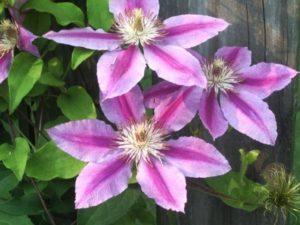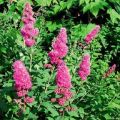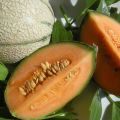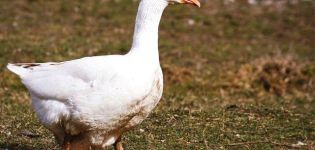Description and subtleties of growing clematis varieties Princess Diana
Clematis Princess Diana has flowers of the original shape and lush foliage. A powerful liana is planted next to gazebos, terraces, hedges. The hybrid is easy to propagate. It is not difficult to look after him, therefore Russian flower growers love him. It is grown in different climatic zones.
Breeding history
Clematis Princess Diana florists have been growing since 1984. It was bred in England, named after Lady Diana. The author of the hybrid is Barry Fretwell. In the course of hybridization, he used representatives of the Clematis texensis group. These varieties have an original flower shape, it resembles a tulip.
Other varieties of this group are popular among amateur flower growers:
- Odoriba;
- Etoile Rose;
- Lawrence
They differ only in the color of the petals. All adapt well in any climatic zone. They are not afraid of heat, low temperatures. Clematis texensis cultivars belong to the 3rd pruning group.
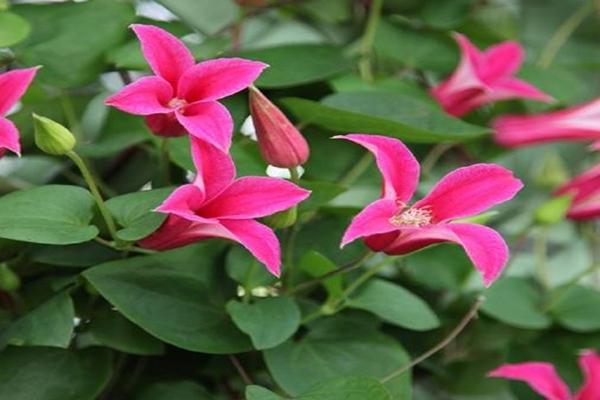
Description and characteristics of clematis Diana
The Princess Diana hybrid blooms long and profusely. The buds bloom from July to September. The flowers have a funnel-shaped, tulip-like shape. The color of the pointed petals is bright pink, the color of the stamens is bright yellow, white or cream. The flowers of the vine are large enough. Their diameter is 5-7 cm. They are all directed upward.
Flower buds form on young shoots of this year. Blossom from late June to October. A hybrid of the 3rd pruning class, all shoots are cut for the winter. During the season, new ones grow in length from 1.5 to 2.5 m. Clematis Princess Diana can be grown in regions of the 4th winter hardiness zone. The underground part of the perennial does not freeze out at -35 ° C.
The merits and demerits of culture
Clematis Princess Diana has a flaw. Perennial is not resistant to fungal diseases. There are several advantages:
- winter hardiness;
- long flowering;
- original flowers;
- no special requirements for soil, care.

Features of growing flowers
Liana Princess Diana, planted with love and by the rules, lives a long time. In the summer, she decorates the garden with her bright flowers.
Landing dates
Princess Diana's seedlings are planted permanently in the spring and fall. The exact timing depends on the climatic conditions of the area.
| Region | Term | |
| Fall | Spring | |
| North Caucasus | October (beginning of the month) | April (beginning of the month) |
| Krasnodar region | ||
| Leningrad region | August (end of month), September (beginning of month) | May |
| Siberia | ||
| Ural | ||
| Middle lane | September (until the middle of the month) | April (end of month), May (beginning of month) |
| Moscow suburbs | ||
Site preparation
The root zone of clematis should be in the shade, and the aboveground part should be illuminated by the sun for at least 5 hours a day. For Princess Diana, areas located in the lowlands, in a draft, in the shade are not suitable. A perennial cannot be planted along the walls of the house if there is no drain on the roof. The soil is needed loose, fertile, neutral or slightly acidic.
Selection and preparation of planting material
It is better for a beginner to buy a seedling in a container. It will take root well. Landing dates do not play a big role. When buying a cut of Princess Diana, which has open roots, they evaluate:
- condition of the roots;
- the appearance of the shoot (shoots);
- the presence of dormant kidneys.
The absence of mechanical damage is an important condition. Planting material is stored in a cool room.

Planting process
To fill the hole, a mixture of humus and garden soil is prepared in a 1: 1 ratio. They fill it with superphosphate, dolomite flour. For 2 buckets they spend:
- 150 g superphosphate;
- 400 g dolomite flour.
The dimensions of the landing pits are 60 * 60 * 70 cm. They are dug no closer than 30 cm from the support, the fence. The bottom is covered with rubble, broken bricks or a mixture of them. So that the water does not stagnate, they maintain a thickness of 20 cm.
Seedlings with an open root system are placed on a small mound, which is poured into the center of the planting pit. It is covered with a prepared fertile mixture. The root collar is buried. After planting, it should be at a depth of 10 cm.There should be a support next to the vine, its optimal height is 1.5-2 m.
Further care
Care is simple, but requires a systematic approach. Only when all the activities are performed, Clematis Princess Diana blooms profusely and for a long time in summer.

Watering
If the plant lacks moisture, flowers and leaves become smaller, crumble. It loses its decorative effect. Young vines are watered at least once a week. In hot, dry weather, more often - 1 time in 5 days. The need for watering arises when the soil dries up at a depth of 20 cm.
Top dressing
In the first year of life, the vine is not fed. Starting from the second year, nutrients are applied annually:
- at the beginning of spring - fertilizers containing nitrogen (urea, ammonium nitrate) and milk of lime;
- when buds appear - fat containing potassium;
- in autumn (after flowering) - superphosphate;
- complex fertilizer for clematis - at the end of autumn.
Mulching and loosening
Princess Diana loves when the soil around the bush is moist. To create comfortable conditions for the plant, the root zone is mulched with peat, humus, compost. To provide oxygen to the roots, the soil is loosened after irrigation (rain).

Pruning
Vine shoots are cut in the fall. Leave small stumps 10-15 cm high. In the southern regions, if you want early flowering, 1-2 strong shoots are left. Pruning in summer stimulates profuse flowering. The faded tops of the shoots are removed.
Preparing for winter
When forecasters predict the first frost, Princess Diana's bush is spud up. A mound 10-15 cm high is formed around the stumps. It will protect the perennial from the first frosts. The soil around the bush is sprayed with a fungicide solution, sprinkled with ash. This is the prevention of fungal diseases.
Shelter for the winter
Florists of the Urals, Siberia do not deprive themselves of pleasure, they grow Clematis Princess Diana on their plots. From severe frosts, an air-dry shelter is built over perennials:
- put a frame 40 cm high (boxes, arches);
- Throw in insulation material (film, foam rubber, reed mats).
The shelter is set up when subzero temperatures are established at night.

Protection against diseases and pests
The hybrid is resistant to powdery mildew pathogens; it can suffer from other types of fungus. Liana must be protected from wilt (verticillary wilting):
- in spring, water the soil around the bush with Previkura solution, add 25 ml of the product to 10 liters of water;
- spray the growing shoots with a 3% solution of copper sulfate;
- dust the root zone and soil with ash.
If brown spots appear on the leaves in the summer, the bush is sprayed with copper oxide. At the end of summer and in autumn, they are treated with copper sulfate for cylindrosporiasis, ascoticosis.
Reproduction methods
Princess Diana is propagated vegetatively. The old bush is rejuvenated by dividing the rhizome. In the fall, they dig it up, divide the root into parts, leaving 1-2 buds on each division. In the spring, when the vine releases young shoots, it is propagated by layering:
- dig a shallow groove;
- put an escape into it;
- pin;
- the groove is covered with soil when the shoot sprouts 10 cm long.
In the summer, the tops of the sprouts are pinched. A year later, the rooted vines are separated from the mother bush and transplanted to a new place.
In late May, early June, the Princess Diana hybrid is propagated by cuttings. Each leaves 2 kidneys and one internode. The material is rooted in fertile soil, which is poured into a container, glass, or on a ridge.

Diana's use in landscaping
Liana is used as an element of vertical garden compositions. Princess Diana decorates gazebos, terraces, masks the working areas of the local area. If the landscape has a complex relief, the hybrid is used as a ground cover plant.
Clematis Princess Diana is planted in the center of flower garden arrangements. Annuals are planted around the vines. They cover the lower part of the bush, creating a useful shadow, hiding the shoots that are bare below.

